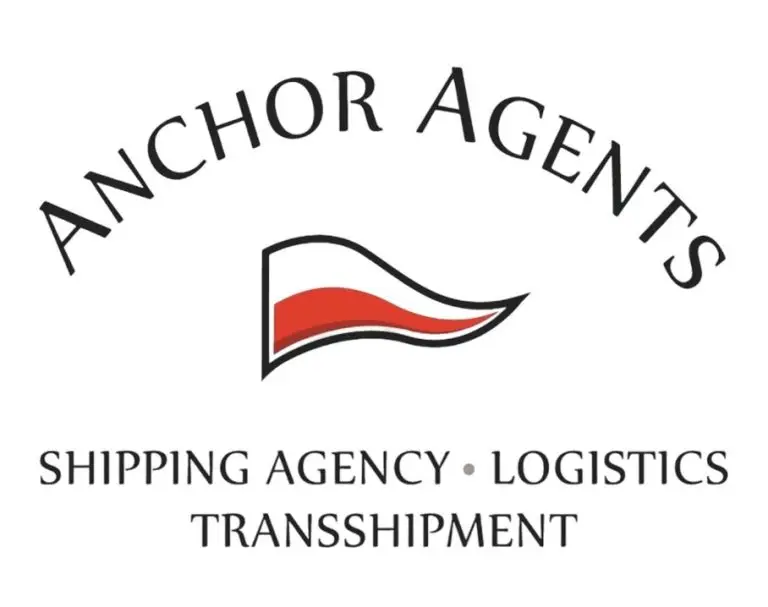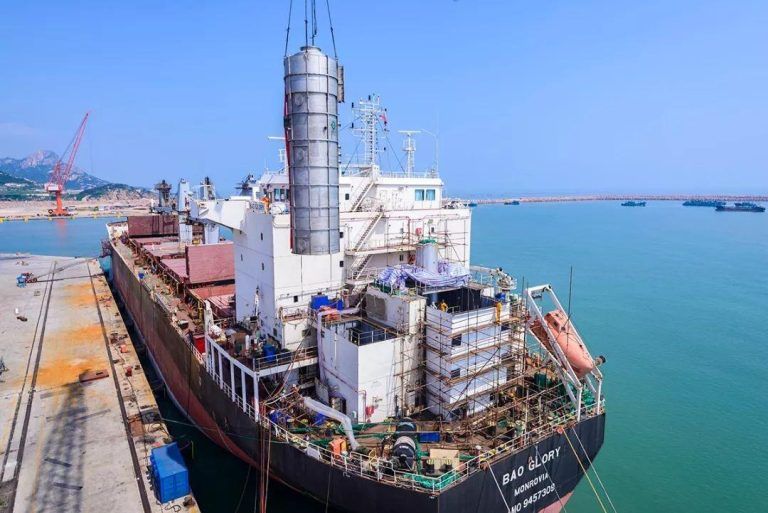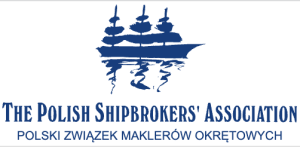
Use of scrubbers on the Baltic Sea and in Polish ports.

Scrubbers are exhaust gas cleaning systems (EGCS) approved as an alternative to low-sulfur fuel oil for seagoing vessels. Seawater is sprayed into the exhaust gas to wash out the sulfur. In addition to the scrubbed sulfur, other pollutants such as heavy metals, oil residues, and polycyclic aromatic hydrocarbons (PAHs) are also discharged into the wastewater. This mixture of pollutants, some of which are long-lived and carcinogenic, is often discharged into the sea almost untreated, polluting the marine environment.
International Maritime Organisation (IMO) regulations impose strict limits on the sulfur content of fuels carried by ships, with a maximum of 0.50% m/m and 0.10% m/m in Emission Control Areas (ECAs), including the Baltic Sea, the North Sea, the United States, Canada, and the United States Caribbean.
Why is it called a „scrubber”?
Scrubs the pollutants from the flue gas (it is also an insulting word in its other meaning, so please be aware of that).
In other words, scrubber technology moves pollutants from the air to the water.
The purpose of this blog post is not to go into detail on the technical aspects of scrubber technology, but some basic information may be helpful to clarify further information:
Open loop scrubber system:
This system uses seawater as the scrubbing and neutralization medium. No other chemicals are required to desulphurize the gases. The exhaust stream from the engine or boiler enters the scrubber and is treated only with alkaline seawater. The volume of seawater used depends on the size and power of the engine.
The system is highly effective but requires a large pump capacity as the amount of seawater needed is large. An open-loop system will work perfectly satisfactorily if the seawater used for scrubbing has sufficient alkalinity. However, seawater with a high ambient temperature, fresh water, and even brackish water are not effective and cannot be used. For these reasons, an open-loop scrubber is not considered a suitable technology for areas such as the Baltic Sea, where salinity levels are not high.
Closed loop scrubber system:
The water is used several times, partially cleaned, and can be stored on board in tanks for a certain period.
Despite their name, closed-loop scrubbers are rarely completely closed systems; most often, there is a bleed-off, i.e., a small volume of scrubber water is discharged into the marine environment to allow the addition of base (typically sodium hydroxide), which is essential to maintain the sulfur oxide removal capacity of the scrubber process. There are only a handful of closed-loop scrubbers worldwide, where ships leave all the sludge and scrubber water produced ashore for disposal rather than discharging it into the marine environment. Although the effluent volumes are smaller (typically a few cubic meters per hour) than those from open-loop scrubbers, the concentrations of pollutants, particularly metals, are often much higher in the effluent. That is due to the recirculation of water in the closed-loop system, which means that the pollutants become enriched over time. The recirculation makes it possible to separate some pollutants, especially PAHs, which are often highly associated with particulate matter. A strong base (usually sodium hydroxide) is continuously added to the water in the closed-circuit scrubber process to maintain the removal capacity of sulfur oxides. The local acidification of the marine environment is not as pronounced as after the discharge of open-loop scrubber water, but the load of other pollutants can still be significant.
If this effluent is not disposed of in port but is discharged outside prohibited areas, it is feared that hot spots, areas with particularly high pollution levels, will develop.
Hybrid scrubber system:
The hybrid scrubber system can operate in either open or closed-loop mode. The process water is either recirculated or discharged directly into the sea. Remotely controlled valves switch between open and closed mode.
Hybrid recirculation systems are primarily used on vessels that operate mainly on the open sea but also to a significant extent in harbors and cruising areas where overboard discharge is prohibited.
Although they combine the advantages of open-loop and closed-loop scrubbers, the main advantage of hybrid scrubbers is their flexibility to operate regardless of the alkalinity of the water in the area. So, when the ship is in a marine environment with high alkalinity, it operates in open-loop mode without using chemical additives. Conversely, it will operate in closed-loop mode in areas with lower alkalinity, with the associated advantages and disadvantages. However, the main disadvantage of hybrid scrubbers is the increased cost compared to both open-loop and closed-loop scrubbers.
Usage of scrubbers in the Baltic Sea:
The Baltic Sea is considered to be particularly sensitive to pollution due to its semi-enclosed nature, low salinity, long residence time of pollutants, low biodiversity, and limited food web with few key species.
A study by Chalmers University of Technology (SWE) showed that scrubber wash water accounts for up to 9% of certain carcinogenic polycyclic aromatic hydrocarbons (PAHs) emissions in the Baltic Sea.
There are an increasing number of countries or ports in the Baltic Sea basin where scrubbers are restricted or prohibited. Please make sure you are up to date with the latest changes.
Usage of scrubbers in Polish ports from January 2024:
Fully operational, certified open-loop scrubbers that reduce sulfur emissions to 0.1% may be used in Polish territorial waters of the Baltic Sea (including roads).
According to the latest guidelines issued by the Gdansk
Harbour Master’s Office, using EGCS open-loop scrubbers is prohibited when entering and within the port area. A vessel operating with an open-loop system must report that to the Harbour Master’s Office on VHF channel 14.
Open-loop scrubbers are still permitted in the ports of Gdynia, Szczecin, and Swinoujscie.
You may also be interested in the following topics:
Ports: What causes low water salinity levels in Polish ports?
Varia: Does the Baltic Sea freeze over in winter?
Ports: Cargo holds washing in Polish ports and on the Baltic Sea
ADDRESS & BUSINESS REGISTRATION
-
Anchor Agents & Shipbrokers Sp z o.o.
Aleja Zwycięstwa 241/13
81-521 Gdynia
Polska - KRS 0000187325; NIP 5881007972
